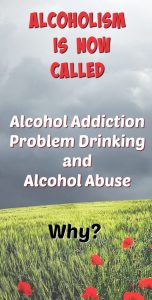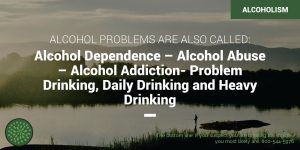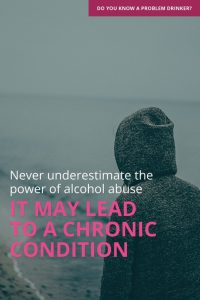Alcohol Addiction Comes In Many Sizes
Alcohol Dependence – Alcohol Abuse – Alcohol Problem- Problem Drinkers
All of these conditions can be summed up simply. People with Alcohol Problems experience a physical and or mental craving for alcohol. Non-problem drinkers don’t respond in that same way. The body chemistry of the problem drinker is different from the body chemistry of the non-problem drinker.

For the problem drinker, for each drink that’s taken the physical craving for alcohol gets significantly stronger. You want the next drink even more. This continues to get stronger and stronger with each drink taken.
The Problem Drinker has no idea that this physical phenomenon of craving is taking place in their body. The way they drink feels perfectly natural and sane to them.
The Non-Problem Drinker
The body chemistry of a non-problem drinker has only one difference than the body chemistry of a Problem Drinker. The Non-Problem Drinker doesn’t create a physical craving for alcohol once they ingest alcohol. Therefore they can often be heard making statements like “I am starting to feel it I better stop now” or ” no thank you (to a free drink) I have had enough”. They feel like “I can control my drinking why can’t you?”.
If when you start drinking you find that at some time after you began to drink (it doesn’t have to be every time) you can’t stop drinking past “your preset limit” there’s a problem. You’re probably suffering from a body chemistry disease known as Alcoholism.
The good news is there is a solution for Alcoholism and we are here to help you conquer Alcohol once and for all.
The Beginnings Stages of Alcoholism
I’ve just described the physical craving for alcohol the alcoholic suffers from. If a beginning stage alcoholic hasn’t had a drink in a few days they don’t have what is known as the physical craving for alcohol. The physical craving only happens when the alcoholic gets alcohol into their system.
This is why many problem drinkers go days and weeks without a drink and then pow they are drunk and in another binder. This is where the mental obsession of the alcoholic comes into play. After a period of heavy drinking, the alcoholic mind creates a mental obsession to have a drink that obsession is so strong no amount of willpower can stop it.
The alcoholic mind tells itself “this time it won’t happen to me, I just want to have a few drinks to celebrate a joyous occasion”. Or that might say “I have it under control I haven’t had a drink in a week”. They might feel the need to drink to stop feeling the pain of a recent or past dramatic event.
The list of reasons why an Alcoholic picks up the first drink goes on and on. This is why an Alcoholic is doomed without help they have an obsession to pick up the first drink and a physical craving for every drink after that.

Alcohol Tolerance is Dangerous
Alcoholics and those who abuse alcohol generally develop a high tolerance for alcohol. This means that more and more alcohol is required to achieve the same buzzed feeling that the individual could previously achieve by consuming less alcohol.
The body becomes almost immune to alcohol so more and more is required to affect the high the alcoholic is trying to achieve. An Alcoholic who has progressed to the point that they drink every day has created a physical addiction to alcohol and they usually cannot go a day without excessive drinking.
Once an alcoholic has reached this point of alcohol addiction it is dangerous for them to quit drinking without professional help with detoxification. Withdrawal symptoms during alcohol detox can be very dangerous, therefore medical monitoring is suggested during the entire process.
Alcohol Detox
Alcohol detoxification usually takes as little as three and up to ten days depending on the length of time and the amounts the alcoholic has been drinking. After detoxification is complete, the recovering alcoholic should enter treatment, which is designed to put alcoholics on the road to a permanent recovery.

SaveSave
